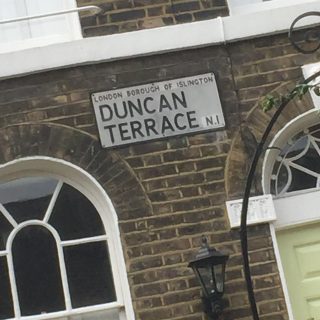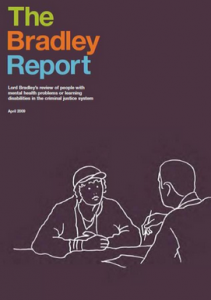All of our first year law undergrads took part in an exercise in week one of their LLB where they escaped City and went to visit a number of buildings of significance in the local area, before tackling some research questions.
They were then asked to write a blog post inspired by their travels. 21 winners were selected from all those posts submitted – this is one of those – thanks to Ahlam Omar.
It is Friday and I am standing outside 64b Duncan Terrace, the former home of essayist Charles Lamb. At this point, I did not think much of this house. Once I arrived home to do my follow up questions on this location, the story surrounding this home is frankly quite unsettling.
I discovered that Lamb once said; ‘Lawyers, I suppose, were children once’[1]. The very same quote that is included in the preface of the famous novel, To Kill A Mockingbird by Harper Lee, a book that made God knows how many people want to become lawyers. Lamb was a man of many complexities, I found this to be the main reason his home resonated with me on my visit. Not only were his works provocative, but his personal life was one of turbulence. One event in his life in particular, was tragic.
However, it is also an issue that remains contentious within the legal world and society. I went on to learn that Lamb’s sister (Mary Lamb), whilst in a state of mania stabbed her mother to death during an argument. [2] The jury returned a verdict of ‘lunacy’, she was free from guilt of wilful murder, but in return her brother had to take personal responsibility for her safekeeping.[3]
Today, mental illness, even in western society remains a taboo. Especially, in combination with criminality. Many, for example, find mental illness to be an excuse to escape jail. According to Together UK, more than seventy per cent of the prison population have some kind of mental health problem.[1] It begs the question, how do we punish those who commit crimes, but do not have the capacity to realise they have?
The Bradley Report highlighted the proposal of a mental health court, according to this model, offenders do not receive prison time but rather, long term community based treatment[2] . Within society, crime is an area that receives wide coverage in the media. It is scandalous and above all, real life. It may be society’s consensus, that we believe prisoners should not be treated well. The prison systems intend is to punish, to deliberately inflict harm. To deprive those we label criminals off their liberties. In reality, those who suffer from mental illness and commit crime, that do escape prison time, will never remain free.
For example, if the UK were to implement the mental health court model, there will be offenders who do not want to go into treatment. By some, this is seen as coercion. Proposed models like these have been criticised for isolating the involvement of those with mental illness in the criminal justice system. The rise of alternatives to combat this problem may be the result of underfunded and ineffective services offered at prisons.[1]
In my view, prisons of the modern age, have become more than prisons. Instead of getting help, many mentally ill offenders cycle through the system over and over again. During my criminal law lecture, I discovered the work of Angela Davis, the famous mind behind the concept of the prison industrial complex. I was in agreement with her view, that since the creation of prisons as a form of punishment, we have not been innovative enough to deal with problems such as mental illness and criminality in more creative ways. We have created a culture of dependency on prisons to deal with offenders. She suggested that we should look to other cultures, such as Native American societies that take a reconciliatory approach to justice.[2]
Was it right for Mary not to receive a prison sentence? I will leave that thought up to you. Lamb, who was her primary carer, wrote that he was ‘almost wishing that Mary were dead’[3]. Even though she was not the burden of the state, she was that of her family. Her illness meant she could never remain herself. Mental illness remains a stigma, even in the English legal system.
All these thoughts entered my mind, but one thought will always remain true. Anyone could become Mary. In our current criminal justice system, we deal with Mary’s everyday. It is one area that will always have us conflicted. However, the fact remains that the law will always remain unsettled, and that is exactly what makes it so exciting.
[1] http://www.together-uk.org/our-mental-health-services/criminal-justice-mental-health/
[2] https://www.rcpsych.ac.uk/pdf/Bradley%20Report11.pdf
[3] http://www.brainyquote.com/quotes/quotes/c/charleslam137133.html
[4] https://en.m.wikipedia.org/wiki/Charles_Lamb#CITEREFHitchcock2005 (pg. 16 – 18)
[5] Hitchcock 2005, pp. 40 – 41
[6]http://www.courtinnovation.org/index.cfm?fuseaction=page.viewPage&pageID=660&nodeID=1
[7] http://www.historyisaweapon.com/defcon1/davisinterview.html
[8] Letter to S.T. Coleridge. Monday, 12 May 1800.



